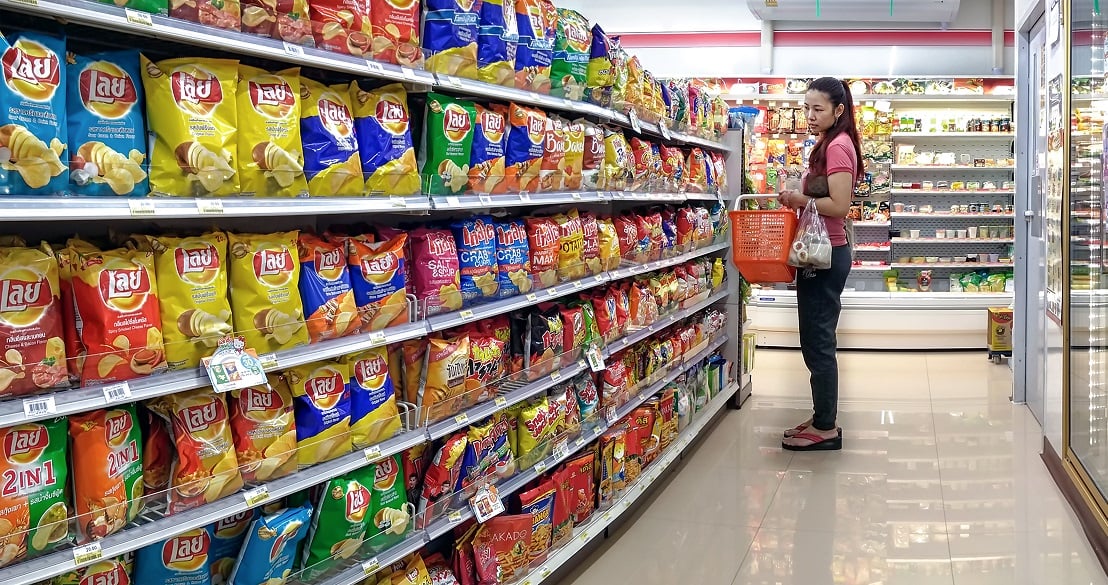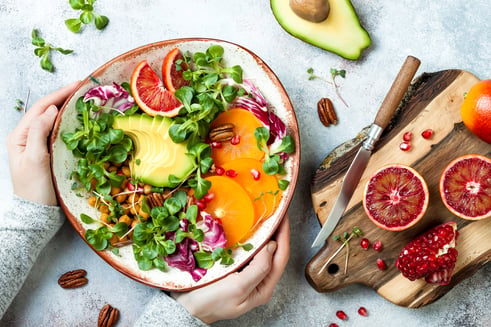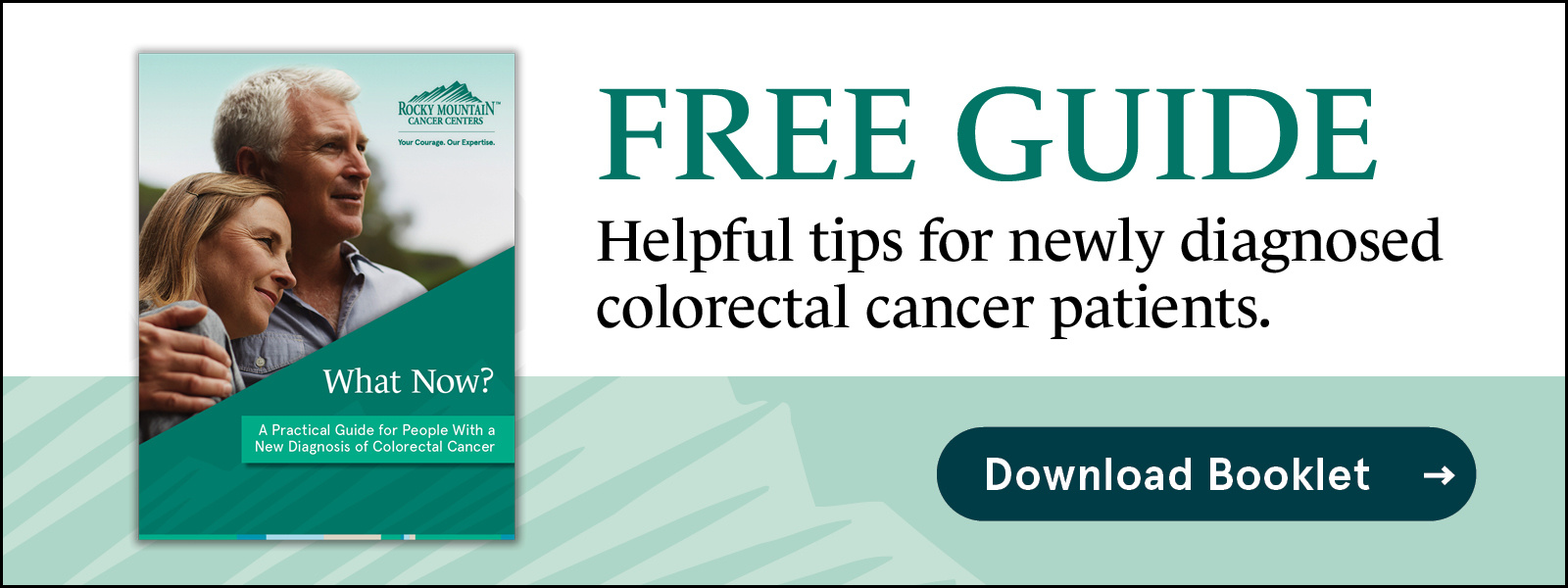Ultra-Processed Foods and Their Connection to Colorectal Cancer
6 min read

Author: Sujatha Nallapareddy, MD
Ultra-processed foods are everywhere – and Americans eat a lot of them. In fact, these added ingredient-rich foods account for 58% of Americans’ energy intake, according to a study in BMJ Open. Such high consumption can have serious health consequences.
Consumption of ultra-processed foods is an established risk factor for colorectal cancer. These foods could be helping to fuel a concerning rise in colorectal cancer rates among young adults. Minimizing your intake of these foods and concentrating on healthier sources of calories may help reduce your risk of colorectal cancer.
What Are Ultra-Processed Foods?
Some foods undergo zero or minimal changes from farm to table. These unprocessed or minimally processed foods retain the good stuff – vitamins, minerals, and proteins – without the addition of unnatural ingredients. Not all processing is bad. Some foods need to undergo minimal processing for transport, storage, or safety purposes. Examples include pasteurizing milk or freezing fruit.
Some foods are subject to intensive alteration before they reach you, and they arise largely from ingredients derived from other foods. These fall into the category of ultra-processed foods.
 Processed meats (luncheon meats and hot dogs), potato chips, cookies, fish-based, ready-to-eat meals, and other ultra-processed foods are abundant in grocery stores and ubiquitous in many home refrigerators and pantries. These foods are often high in added sugars, hydrogenated fats, and other unhealthy, food-derived ingredients. Many ultra-processed foods also contain artificial colors and flavors to make them more appealing, and preservatives to extend their shelf life.
Processed meats (luncheon meats and hot dogs), potato chips, cookies, fish-based, ready-to-eat meals, and other ultra-processed foods are abundant in grocery stores and ubiquitous in many home refrigerators and pantries. These foods are often high in added sugars, hydrogenated fats, and other unhealthy, food-derived ingredients. Many ultra-processed foods also contain artificial colors and flavors to make them more appealing, and preservatives to extend their shelf life.
Eating a lot of ultra-processed foods can be harmful to your health. For one, a diet high in these foods may lead to a higher caloric intake. That, in turn, can cause weight gain, obesity, and Type 2 diabetes. In addition, deriving a lot of daily calories from ultra-processed foods may lead to problems with thinking and memory loss. Finally, there’s a link between ultra-processed foods and colorectal cancer risk.
How Ultra-Processed Foods Can Increase Your Risk of Colorectal Cancer
We’ve known for some time that a diet high in processed meats is one of the risk factors for developing colorectal cancer. Now, a new study is shedding additional light on the connection between ultra-processed foods and colorectal cancer risk.
A 2022 study in BMJ involving more than 200,000 people and more than 3,200 cases of colorectal cancer sought to better understand how eating ultra-processed foods affects cancer risk. The study found that, over nearly three decades, men with the highest rates of eating ultra-processed foods were 29% more likely to develop colorectal cancer than men with the lowest rates of consuming these foods.
One reason for the association between ultra-processed foods and a higher risk of colorectal cancer could be these foods’ effects on your gut microbiome. This is the delicately balanced community of bacteria and other organisms that live in your gut and help with digestion.
“Ultra-processed foods are altering the gut microbiome, leading to an imbalance between the good bacteria in your gut that prevent inflammation and decrease the risk of colorectal cancer,” said Dr. Sujatha Nallapareddy, medical oncologist and hematologist at Rocky Mountain Cancer Centers (RMCC). “An altered microbiome leads to increased inflammation in the microbiome and a higher risk for cancer. That’s one of the reasons that’s been postulated for the increased risk of colorectal cancer among young adults.”
Interestingly, the study did not find that women’s overall consumption of ultra-processed foods affected their colorectal cancer risk. One potential reason is that women may eat fewer of these foods than men. Dr. Nallapareddy says other studies show that estrogen helps protect women against colorectal cancer.
Minimize Ultra-Processed Foods, Maximize Healthier Choices
Can we point to certain ingredients in ultra-processed foods that may drive colorectal cancer risk? One group of additives, dietary emulsifiers, may play such a role. Animal studies have shown that these additives can alter the gut microbiomes of mice. This can lead to inflammation and the formation of tumors.
You can reduce your risk of developing colorectal cancer by adjusting your diet if it includes too many ultra-processed foods and not enough unprocessed or minimally processed foods. It’s not necessary to give up ultra-processed foods altogether. You should, however, think of these foods as occasional treats, not staples of your diet. Dr. Nallapareddy advises moderation.
“ If you’re eating highly processed foods, you have to also incorporate other foods, fruits, and vegetables, which can offset the consumption of ultra-processed items,” she said. “There’s not exactly a limit or guideline. You just need to use your judgment, not consume a lot of these foods, and balance them with a healthy diet.”
If you’re eating highly processed foods, you have to also incorporate other foods, fruits, and vegetables, which can offset the consumption of ultra-processed items,” she said. “There’s not exactly a limit or guideline. You just need to use your judgment, not consume a lot of these foods, and balance them with a healthy diet.”
Dr. Nallapareddy also advises approaching high-protein diets with caution.
What can you eat to reduce your colorectal cancer risk? Whole (unprocessed) foods, especially fresh fruits and vegetables, are excellent choices. So are beans, low-fat dairy and whole-grain foods. Foods that promote colon health include:
- Apples
- Bananas
- Black beans
- Broccoli
- Kidney beans
- Leafy greens
- Lentils
- Nuts
- Oatmeal
- Oranges
- Whole-grain bread
- Yogurt
Adopting a healthy eating pattern can be the gateway to other lifestyle changes that can help reduce your colorectal cancer risk. Check out our nutrition blog for healthy recipes.
Other Ways to Turn Down Your Risk of Colorectal Cancer
You can’t change every colorectal cancer risk factor. There’s nothing you can do, for example, about inheriting a genetic mutation that makes colorectal cancer more likely. Still, you have a lot of power to reduce your risk.
“The main thing with ultra-processed foods, and especially for younger generations between ages 20 and 50, is that they may contribute to this group’s high risk for developing colorectal cancer,” Dr. Nallapareddy said. “If we can cut down on consumption of these foods, we might see a decrease in the incidence of colorectal cancer in the younger population.”
Get our complete overview of colorectal cancer screening recommendations.
More risk-reduction steps you can take include:
- Get moving. Regular physical activity can help reduce your colorectal cancer risk. Exercising and healthy eating can help you get to and maintain a healthy weight – another risk reducer.
- Get regular colorectal cancer screenings. Early-stage colorectal cancer has a five-year relative survival rate of about 90%, according to the American Cancer Society. The key to finding it early is having regular screenings. These should start at age 45 if you’re at average risk for colorectal cancer, or earlier if your risk is high. Several screening options, some noninvasive, are available. Only a colonoscopy, however, allows a physician to find and remove precancerous polyps at the same time, reducing your risk of cancer in the process.
- Minimize alcohol consumption as much as possible. Men should limit themselves to two drinks per day, and women, one. You’ll gain the most protection, however, by not drinking at all.
- Stop smoking – or don’t start. You’re more likely to develop colorectal cancer if you smoke, especially for a long time.
Have you been diagnosed with colorectal cancer? Find a colorectal cancer specialist at RMCC who will work with a multidisciplinary team to create a personalized treatment plan. See who is on each patient's colorectal cancer treatment team.

